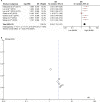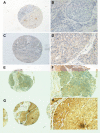INHBA upregulation correlates with poorer prognosis in patients with esophageal squamous cell carcinoma
- PMID: 29950896
- PMCID: PMC6014728
- DOI: 10.2147/CMAR.S160186
INHBA upregulation correlates with poorer prognosis in patients with esophageal squamous cell carcinoma
Abstract
Purpose: INHBA, which encodes a member of the TGF-beta superfamily of proteins, has been identified to play a critical role in different types of cancer. However, its clinical significance in esophageal squamous cell carcinoma (ESCC) has never been reported.
Patients and methods: In this study, we collected 239 ESCC paraffin-embedded specimens and measured the expression of INHBA with immunohistochemistry (IHC). The clinical and prognostic significance of INHBA expression was statistically analyzed. What is more, we conducted a meta-analysis to study the prognostic value of INHBA expression in multiple types of solid tumors.
Results: The results showed that INHBA expression was observed predominantly in the cytoplasm of cells in the ESCC specimens. INHBA expression was closely correlated with N categories (P=0.026). Kaplan-Meier analysis showed that ESCC patients in the low INHBA expression subgroup had significantly better prognosis than those with high INHBA level. Subgroup analysis revealed that INHBA distinguished the disease-free survival (DFS) and overall survival (OS) when patients were stratified by TNM stage status and N status. Multivariate analysis results suggested that INHBA expression was an independent factor that affected OS (HR =1.679, P=0.022) and DFS (HR =1.715, P=0.017). In the meta-analysis, six papers with 1321 patients were included and patients with high INHBA level had worse prognosis than patients with low INHBA level (HR 2.50, 95% CI 1.75-3.57, P<0.0001).
Conclusion: High INHBA level predicts poor prognosis in ESCC and other solid tumors. More studies are required to elucidate the role of INHBA and its clinical application in cancer settings.
Keywords: ESCC; INHBA; meta-analysis; prognosis.
Conflict of interest statement
Disclosure The authors report no conflicts of interest in this work.
Figures




References
-
- Okano M, Yamamoto H, Ohkuma H, et al. Significance of INHBA expression in human colorectal cancer. Oncol Rep. 2013;30(6):2903–2908. - PubMed
-
- Wang Q, Wen YG, Li DP, et al. Upregulated INHBA expression is associated with poor survival in gastric cancer. Med Oncol. 2012;29(1):77–83. - PubMed
-
- Lee HY, Li CC, Huang CN, et al. INHBA overexpression indicates poor prognosis in urothelial carcinoma of urinary bladder and upper tract. J Surg Oncol. 2015;111(4):414–422. - PubMed
-
- Oshima T, Yoshihara K, Aoyama T, et al. Relation of INHBA gene expression to outcomes in gastric cancer after curative surgery. Anticancer Res. 2014;34(5):2303–2309. - PubMed
LinkOut - more resources
Full Text Sources
Other Literature Sources

